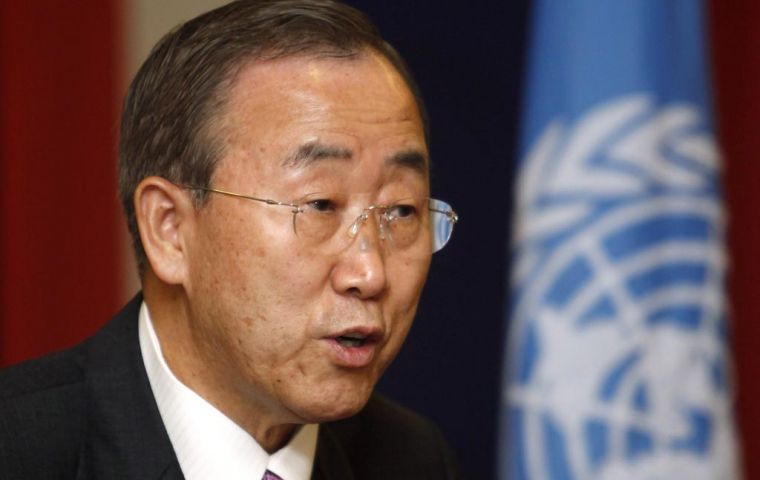MercoPress. South Atlantic News Agency
The year of the seven-billionth baby, up two billion since July 1987
 Ban Ki-moon: “We have enough food for everyone, yet nearly a billion go hungry”
Ban Ki-moon: “We have enough food for everyone, yet nearly a billion go hungry” The United Nations marked on Monday July 11, World Population Day, with Secretary-General Ban Ki-moon stressing that ending global poverty and inequality was the key to unleashing the great human potential for prosperity and peaceful coexistence.
“Later this year, a seven-billionth baby will be born into our world of complexity and contradiction” Ban said in a message to mark World Population Day, observed annually since 1987 on 11 July, when world population reached five billion.
“We have enough food for everyone, yet nearly a billion go hungry. We have the means to eradicate many diseases, yet they continue to spread. We have the gift of a rich natural environment, yet it remains subject to daily assault and exploitation. All people of conscience dream of peace, yet too much of the world is in conflict and steeped in armaments,” said the Secretary-General.
Ban said the global focus should be on improving the welfare of the people by promoting the achievement of the Millennium Development Goals (MDGs), the eight poverty reduction targets that the international community has agreed to strive to attain by 2015.
“When we act on our shared values, we contribute to our common future. Ending poverty and inequality unleashes vast human potential,” he said.
To mark the Day, the UN Population Fund (UNFPA) launched the “7 Billion Actions’ campaign to promote dialogue on the challenges, opportunities and actions that will be needed to ensure a better future for humanity.
“While poverty, inequality and increased stress on resources represent major challenges, the world is more interconnected than ever before, creating enormous possibilities,” said UNFPA Executive Director Babatunde Osotimehin in his message to mark the Day.
“We now have unprecedented capacity to share information and ideas, and engage communities across the globe to solve common problems. Reducing inequities and improving living standards for people alive today - as well as for generations to follow - will require new ways of thinking and unparalleled global cooperation. The moment to act is now,” said Mr. Osotimehin.
He said that protecting reproductive health and rights was fundamental for sustainable development, and called for concerted efforts to meet the needs of some 215 million women in developing countries who have the desire to plan and space the birth of their children but lack access to modern contraception.
Osotimehin stressed that, acting together, the world has the capacity to prevent the deaths of 1,000 women who lose their lives every day to complications of pregnancy and childbirth.
“We have an opportunity and responsibility to invest in the world 1.8 billion adolescents and youth aged 10 to 24. They constitute more than a quarter of the world’s population and almost 90% live in developing countries. Every young person deserves education, including sexuality education, and access to comprehensive health services” said Mr. Osotimehin.
According to UNFPA, the global population has doubled since 1968 and grown by almost 40% since reaching 5 billion in 1987, when the first World Population Day was observed. Population growth is projected to continue at least until the middle of this century despite dramatic declines in the average number of children per woman.
The vast majority of the population growth - 97 of every 100 people - is occurring in less developed countries, some of which already struggle to meet their citizens’ needs.
The gap between rich and poor is growing, as urbanization and migration continue, while climate change is an increasing concern with a rising number of people becoming vulnerable to food insecurity, water shortages and weather-related disasters, according to the UNFPA. On the other hand, many rich and middle-income countries are concerned about low fertility and ageing.




Top Comments
Disclaimer & comment rulesCommenting for this story is now closed.
If you have a Facebook account, become a fan and comment on our Facebook Page!